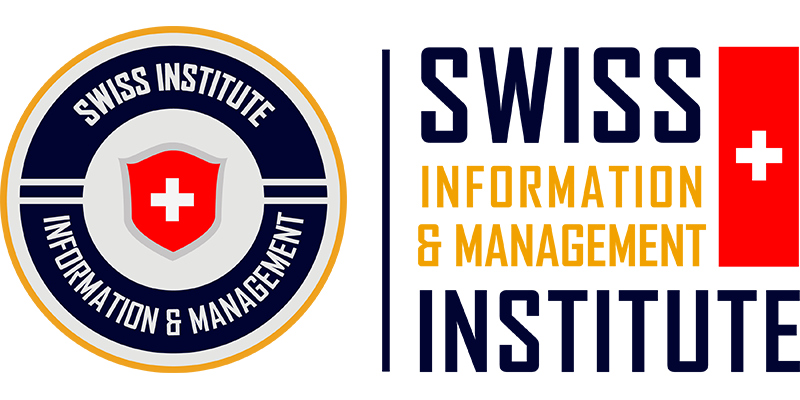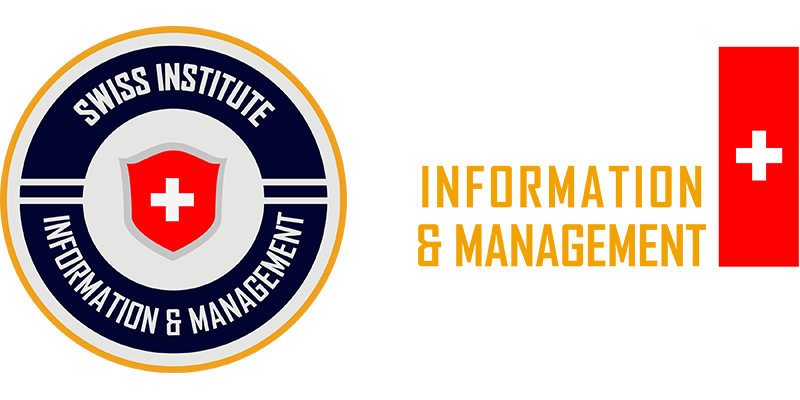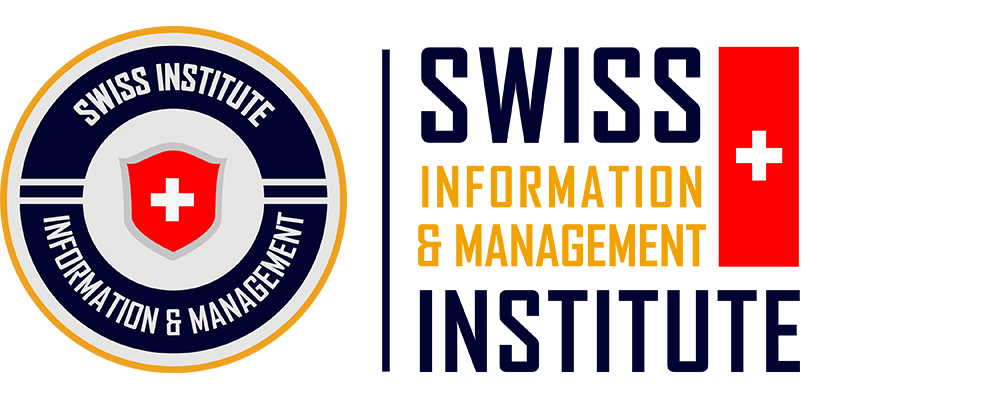Master of Science in Logistics and Supply Chain Management
The only Master of Science in Logistics and Supply Chain Management program in Switzerland aligned with the National Occupational Standard
Master of Science in Logistics and Supply Chain Management program, developed by LSCM Switzerland (a member of SIMI Swiss) in collaboration with the Ofqual UK.Gov awarding body OTHM, provides learners with access to knowledge in a rapidly evolving field facing a workforce shortage, while offering the flexibility to study anytime, anywhere.
Upon graduation, learners can work, conduct research, and teach in various fields. Career opportunities include positions in businesses and universities related to shipping companies, airlines, airports, road transport, maritime transport, seaports, and railways. Additionally, graduates can pursue roles in supply chain management, traffic control, highway operations, toll management, as well as communication systems and passenger services.
Along with globally recognized qualification, the SIMI Swiss Master program understands what students need:
- Multiple Qualifications from SIMI & the Ofqual UK.Gov awarding body
- Ability to take the exam to receive a Certified Sustainable Supply Chain Professional from ISCEA
- Fully Accredited & Recognized
- The Swiss Student Card confirms official Swiss student status and eligibility with SIMI Swiss
- Certified & Micro-Credentials Included
- Stay updated with the latest trends
- Flexible Learning Model
- Expand your business network
- Academic Support While Studying
- Tuition fee support provided by Swiss EduFund
Dual Qualifications within a Master Program:
- Master of Science in Logistics and Supply Chain Management from the Swiss Information and Management Institute
- Level 7 Diploma in Logistics and Supply Chain Management from the Ofqual UK.Gov awarding body OTHM (603/5865/8)
International Accreditation
SIMI is accredited at both the institutional and programmatic levels by ASIC, HEAD, ISO 21001:2018, OTHM, and Qualifi, which is recognized by Ofqual.
Dual Qualification with OTHM
The program is widely recognized by the business community and partners, helping to optimize the use of the diploma after graduation.
CSSCP from ISCEA
After graduation, students have enough knowledge to take the exam to receive the Certified Sustainable Supply Chain Professional (CSSCP) certificate from ISCEA.
Academic & Research Support
The academic, research and language support system helps students overcome challenges so they can focus solely on excelling in their studies.
Courses & Learning Outcomes
1. Logistics Management (R/618/1229)
Overview
- Addresses the fundamental principles of logistics management, including its strategic role and value-added factors within supply networks.
- Focuses on analyzing current issues such as transportation costs, e-commerce growth, sustainability, and emerging technologies in logistics.
Unit aim
- Analyze issues and performance in logistics systems.
- Apply strategies to optimize logistics operations.
- Develop solutions to improve efficiency using new technologies.
Course Details
This course is accredited and aligned with National Occupational Standards. Learners can earn a Master Award from SIMI Swiss by completing this course independently as a Micro Credential.
- View details on Learning Outcomes, Topics, and Suggested Readings HERE.
2. Supply Chain Planning, Modelling and Analytics (L/618/1231)
Overview
- Covers supply chain planning models and methods, including data analysis and forecasting.
- Explores inventory management methods, location analysis, and Enterprise Resource Planning (ERP) system integration.
Unit aims
- Understand and apply planning techniques in supply chain management.
- Analyze and implement supply chain data analytics tools.
- Develop models to optimize supply chain performance.
Course Details
This course is accredited and aligned with National Occupational Standards. Learners can earn a Master Award from SIMI Swiss by completing this course independently as a Micro Credential.
- View details on Learning Outcomes, Topics, and Suggested Readings HERE.
3. Procurement and Supply Management (Y/618/1233)
Overview
- Focuses on the strategic role of procurement management within supply chains, including selection processes, negotiation, and contract management.
- Explores tools and technologies supporting procurement, such as cost analysis, supplier management, and e-procurement.
Unit aims
- Analyze value-adding elements in procurement and supply chain management.
- Apply tools and efficient procurement processes.
- Manage supplier relationships to optimize business efficiency.
Course Details
This course is accredited and aligned with National Occupational Standards. Learners can earn a Master Award from SIMI Swiss by completing this course independently as a Micro Credential.
- View details on Learning Outcomes, Topics, and Suggested Readings HERE.
4. Supply Chain and Operations Strategy (H/618/1235)
Overview
- Addresses supply chain and operations management strategies to enhance competitiveness and efficiency.
- Explores theories and methods of performance measurement in supply chain and operations management.
Unit aims
- Evaluate key factors affecting supply chain and operations management efficiency.
- Develop strategies for sustainable supply chain management.
- Apply performance measurement methods to improve organizational effectiveness.
Course Details
This course is accredited and aligned with National Occupational Standards. Learners can earn a Master Award from SIMI Swiss by completing this course independently as a Micro Credential.
- View details on Learning Outcomes, Topics, and Suggested Readings HERE.
5. Sustainable Operations Management (T/508/0626)
Overview
- Addresses the concepts and practices of sustainable operations management, including environmental, social, and economic factors.
- Explores innovative solutions to improve sustainability in supply chains, from product design to operational management.
Unit aims
- Understand and apply methods to improve sustainability in business.
- Analyze barriers and solutions for promoting sustainability in supply chains.
- Develop sustainability plans tailored to business contexts.
Course Details
This course is accredited and aligned with National Occupational Standards. Learners can earn a Master Award from SIMI Swiss by completing this course independently as a Micro Credential.
- View details on Learning Outcomes, Topics, and Suggested Readings HERE.
6. Business Research Methods (T/508/0626)
Overview
- Focuses on research principles, from forming research questions, analyzing literature, to designing data collection methods.
- Emphasizes quantitative and qualitative analysis, using tools like SPSS, and presenting research findings effectively.
Unit aims
- Develop research questions and propose appropriate research methods.
- Conduct data analysis and draw scientific conclusions.
- Write professional research reports that meet academic standards.
Course Details
This course is accredited and aligned with National Occupational Standards. Learners can earn a Master Award from SIMI Swiss by completing this course independently as a Micro Credential.
- View details on Learning Outcomes, Topics, and Suggested Readings HERE.
7. Master’s Capstone Project
Capstone Project is the final assignment that Master's students undertake at the end of their program. The objective of the Capstone Project is to synthesize and apply the knowledge and skills students have accumulated throughout their studies. Unlike traditional examinations, the Capstone Project requires students to solve real-world problems or face challenges in their field.
Main Features of the Capstone Project:
- Practical Application: Students address real-world issues in the transportation and logistics industry, conduct in-depth research, or develop strategic plans for an organization, whether real or simulated.
- Knowledge Integration: The project requires students to synthesize and apply concepts from various courses in the program, demonstrating systems thinking and the ability to use information effectively in a professional setting.
- Research Element: An essential part of the Capstone Project involves collecting, analyzing, and interpreting data to support conclusions and recommendations.
- Collaboration: Group projects simulate collaborative environments in the logistics industry, while individual projects allow students to focus deeply on a specific area of expertise.
- Presentation and Defense: Students present their Capstone Project to a panel of faculty or experts, defending their methodology, findings, and recommendations.
Benefits of the Capstone Project:
- Practical Experience: Students have the opportunity to solve real business problems and apply knowledge to real-world situations.
- Skill Development: The Capstone Project enhances critical thinking, problem-solving, research, and communication skills.
- Work Portfolio: The final product of the Capstone Project can serve as proof of capability, aiding in job interviews or career advancement.
- Networking Opportunities: The Capstone Project often creates opportunities to connect with industry professionals and build valuable relationships.
Throughout the development of the Capstone Project, students are supported by research assistants, English support systems, and the academic support system.
Entry requirements & Learning methods
1. Entry Requirements
In addition to the entry requirements, candidates applying to the program are also assessed for their suitability by the admissions committee before joining the program to ensure that they can acquire and benefit from the program.
Entry requirements:
To enroll this program, learners must possess one of the criteria below:
- A Bachelor’s qualification in Majors from accredited universities;
- Or a Level 6 EQF diploma or an equivalent qualification from organizations that are authorized to issue qualifications and have been accredited.
English requirements:
If a learner is not from a predominantly English-speaking country, proof of English language proficiency must be provided.
- Common European Framework of Reference (CEFR) level B2 or equivalent;
- Or A minimum TOEFL score of 101 or IELTS 5.5; Reading and Writing must be at 5.5 or equivalent.
Please note:
- SIMI Swiss does not accept entry qualifications from counterfeit universities, Diploma Mills, or universities accredited by unreliable accreditation agencies.
- SIMI reserves the right to make admissions decisions based on the requirements of recognized agencies and the global quotas of the program.
2. Learning methods
1. Off-Campus Mode
The program is a combination between Live Classes with local tutors (where applicable) for a hybrid learning experience.
- Offering interactive, real-time engagement with instructors.
- Local tutors provide additional guidance to help learners apply theoretical concepts to practical scenarios.
- Ideal for busy professionals seeking flexibility with personalized support.
Learn more about overview of enrolling in online classes at SIMI Swiss [Video HERE]
Learn more about the Effective of SIMI Pedagogy [Video HERE]
2. Fully Online Model
The program is implemented using a combined automated training model that includes:
- Optimized Online Learning System: Designed to enhance the self-study process.
- Bite-Sized Lectures: Lessons are structured in short, manageable modules, enabling students to grasp the content immediately after completing each module.
- Comprehensive Support System: Provides students with the necessary tools and support to efficiently fulfill course requirements.
Learn more about how to use the automated training model at SIMI Swiss [Video HERE]
3. Academic Support
We understand that pursuing an accredited postgraduate program can be both exciting and challenging, especially for busy adult learners. To help you overcome these challenges, we’ve created the SIMI Swiss Supporting Systems, designed to guide you through any difficulties during your studies.
For a full overview of the support available, be sure to watch our informative videos, offering help at every stage of your academic journey.
Supplemental resources and Master Pro Certified
1. Supply 30 courses mapped to National Occupational Standards
The National Occupational Standards are an important standard to ensure that educational programmes meet the needs of the workplace. The programme is fully aligned with the Supply Chain Leadership Professional position according to the national competency framework. As it is a certified and nationally aligned learning material, students can use it to obtain additional UK and European national competency qualifications.
Beyond the comprehensive curriculum, students gain access to an additional 30 professional modules covering a wide range of specializations. This expanded knowledge base enables students to build on their classroom learning and directly apply it to their specific job roles and needs, offering valuable tools for professional growth.
Unlike other study materials, this interactive and exclusive set of resources, developed by SIMI Swiss, is specifically designed for self-study. The knowledge system, aligned with the National Occupational Standard, is divided into 30 knowledge groups, each further broken down into bite-sized lessons. This approach allows students to absorb content quickly and effectively, even when away from their computer or phone.
- Learn more about the National Occupational Standard system [HERE].
- Learn more about the exclusive pedagogy for the supplemental interactive study materials [HERE].
The 30 interactive courses that enhance knowledge and automatically accumulate 30 separate Master Pro Certifications include:
- Qualities of effective leadership: Learners will explore the making and developing of powerful leaders.
- Developing interpersonal skills: Connecting and bonding with people within the commercial sectors is extremely important for good business. This module trains learners in skills to improve and enhance communication techniques to create strong bonds.
- Motivating and influencing people: Inspiring people to create a unity of direction within business.
- Making decisions: Doing the right things in the right way at the right time. Learners will look at the process of making a good decision.
- Creativity and problem-solving: Do problems pose a threat or are they an opportunity to improve? Here, learners will figure out how to turn a problem into an advantage.
- Studying and using management theories: There are many theories concerned with management and the various models developed from these theories. This module looks over these theories with real-life examples.
- The external operating environment of business: Planning for influences on the business outside your control.
- Culture and ethics: The culture and ethics involved in the business world today.
- Governance and directorships: Structuring and controlling a business in a professional way.
- Analysing the competition: What are my competitors doing, how are they doing it, and why are they doing it? Reviewing and analysing competitors’ actions to enhance managerial roles.
- Marketing strategy: Creating an effective and successful market presence. Looking at the development of marketing strategies to create successful marketing campaigns.
- High performance sales: Learners will grasp the key elements of successful selling.
- E-Marketing communication: Understanding and using effective electronic messages to market.
- Customers and their needs: Ensuring that your customers are recognised and valued.
- Strategic human resource management: Human Resource Management must play a central role in the strategy of any organization. It is concerned with people as an asset of the business.
- Recruiting and CPD: Getting the best people. Developing the best people. Keeping the best people.
- Measuring and rewarding performance: Knowing and measuring how your people are performing.
- Interpreting business accounts: Using and understanding the litmus tests of business health.
- Tools of financial analysis: Resources, tools, and techniques to keep a finger on the pulse of the business.
- Managing cash and working capital: Cash, cash flow, and working capital. The lifeblood of business.
- Exercises in quantitative techniques: How to use and understand key figures.
- Impact of technology on business: Analyse and exploit the role of e-business within a business sector.
- Innovation and R&D: Creating commercial advantage from innovation and research.
- Implementing and managing quality systems: Right first time, right every time. The place of quality in business strategy.
- Strategic planning tools: Resources, tools, and ideas to help create an effective business strategy.
- Strategic and systems management: Options for strategic direction. Making the right choices for your business.
- The business plan: Creating a plan that targets the stated aims and objectives of a business.
- Developing high-performance teams: Cohesion and teamwork that enhances business performance.
- Managing projects: Getting things done. Using the right tools to run projects.
- Strategies for growth: This module explores the different ideas of growth and the various tools, measures, and controls at a manager’s disposal in planning for growth.
2. Supply 30 webinars mapped to National Occupational Standards
In addition to comprehensive lessons with built-in interactive activities and an exclusive self-study pedagogy, each knowledge module aligned with the National Occupational Standard includes instructional videos (webinars). Students are provided with 30 video webinars corresponding to the 30 interactive modules, ensuring a well-rounded and complete learning experience.
The 30 video webinars include:
- Webinar - Qualities of effective leadership: Learners will explore the making and developing of powerful leaders.
- Webinar - Developing interpersonal skills: Connecting and bonding with people within the commercial sectors is extremely important for good business. This module trains learners in skills to improve and enhance communication techniques to create strong bonds.
- Webinar - Motivating and influencing people: Inspiring people to create a unity of direction within business.
- Webinar - Making decisions: Doing the right things in the right way at the right time. Learners will look at the process of making a good decision.
- Webinar - Creativity and problem-solving: Do problems pose a threat or are they an opportunity to improve? Here, learners will figure out how to turn a problem into an advantage.
- Webinar - Studying and using management theories: There are many theories concerned with management and the various models developed from these theories. This module looks over these theories with real-life examples.
- Webinar - The external operating environment of business: Planning for influences on the business outside your control.
- Webinar - Culture and ethics: The culture and ethics involved in the business world today.
- Webinar - Governance and directorships: Structuring and controlling a business in a professional way.
- Webinar - Analysing the competition: What are my competitors doing, how are they doing it, and why are they doing it? Reviewing and analysing competitors’ actions to enhance managerial roles.
- Webinar - Marketing strategy: Creating an effective and successful market presence. Looking at the development of marketing strategies to create successful marketing campaigns.
- Webinar - High performance sales: Learners will grasp the key elements of successful selling.
- Webinar - E-Marketing communication: Understanding and using effective electronic messages to market.
- Webinar - Customers and their needs: Ensuring that your customers are recognised and valued.
- Webinar - Strategic human resource management: Human Resource Management must play a central role in the strategy of any organization. It is concerned with people as an asset of the business.
- Webinar - Recruiting and CPD: Getting the best people. Developing the best people. Keeping the best people.
- Webinar - Measuring and rewarding performance: Knowing and measuring how your people are performing.
- Webinar - Interpreting business accounts: Using and understanding the litmus tests of business health.
- Webinar - Tools of financial analysis: Resources, tools, and techniques to keep a finger on the pulse of the business.
- Webinar - Managing cash and working capital: Cash, cash flow, and working capital. The lifeblood of business.
- Webinar - Exercises in quantitative techniques: How to use and understand key figures.
- Webinar - Impact of technology on business: Analyse and exploit the role of e-business within a business sector.
- Webinar - Innovation and R&D: Creating commercial advantage from innovation and research.
- Webinar - Implementing and managing quality systems: Right first time, right every time. The place of quality in business strategy.
- Webinar - Strategic planning tools: Resources, tools, and ideas to help create an effective business strategy.
- Webinar - Strategic and systems management: Options for strategic direction. Making the right choices for your business.
- Webinar - The business plan: Creating a plan that targets the stated aims and objectives of a business.
- Webinar - Developing high-performance teams: Cohesion and teamwork that enhances business performance.
- Webinar - Managing projects: Getting things done. Using the right tools to run projects.
- Webinar - Strategies for growth: This module explores the different ideas of growth and the various tools, measures, and controls at a manager’s disposal in planning for growth.
3. Earn 30 Master Pro Certifications via automated testing
Although a Master of Science in Transportation and Logistics is an important demonstration of academic achievement at the Master's level, in the workplace, recognition of specific competencies for specific positions also plays a very important role in the success of a Logistics major.
As a program mapped to National Occupational Standards, along with the supplemental knowledge system, students can engage in self-study through interactive lessons, attend webinars, and take online tests to earn 30 Master Pro Certifications. Each ProCert reflects Level 7 (Master Level), outlines the Learning Outcomes, and provides certification upon completion.
If students wish to convert their e-Master Pro Certifications to hard copies, they can use an optional service for a minimal fee.
The 30 Master ProCerts that learners can obtain during the Master of Science in Logistics and Supply Chain Managementprogram (note: this is optional):
- Level 7 Certified for Qualities of effective leadership
- Level 7 Certified for Developing interpersonal skills
- Level 7 Certified for Motivating and influencing people
- Level 7 Certified for Making decisions
- Level 7 Certified for Creativity and problem-solving
- Level 7 Certified for Studying and using management theories
- Level 7 Certified for The external operating environment of business
- Level 7 Certified for Culture and ethics
- Level 7 Certified for Governance and directorships
- Level 7 Certified for Analysing the competition
- Level 7 Certified for Marketing strategy
- Level 7 Certified for High performance sales
- Level 7 Certified for E-Marketing communication
- Level 7 Certified for Customers and their needs
- Level 7 Certified for Strategic human resource management
- Level 7 Certified for Recruiting and CPD
- Level 7 Certified for Measuring and rewarding performance
- Level 7 Certified for Interpreting business accounts
- Level 7 Certified for Tools of financial analysis
- Level 7 Certified for Managing cash and working capital
- Level 7 Certified for Exercises in quantitative techniques
- Level 7 Certified for Impact of technology on business
- Level 7 Certified for Innovation and R&D
- Level 7 Certified for Implementing and managing quality systems
- Level 7 Certified for Strategic planning tools
- Level 7 Certified for Strategic and systems management
- Level 7 Certified for The business plan
- Level 7 Certified for Developing high-performance teams
- Level 7 Certified for Managing projects
- Level 7 Certified for Strategies for growth
Check out the way you could get 30 electric Master Professional Certified [Video HERE]
Program accreditations
1. Accreditation review guidelines by SIMI Swiss
SIMI is the first higher education institute in Zug, Switzerland, to achieve comprehensive international accreditations at both the organizational and program levels. The video below guides you through the step-by-step process of verifying and checking SIMI Swiss's accreditations and recognitions.
- Watch this video to learn how to verify SIMI Swiss's accreditations and recognitions HERE.
- View the complete accreditation system of SIMI Swiss HERE.
Sample of Master of Science in Logistics and Supply Chain Management:
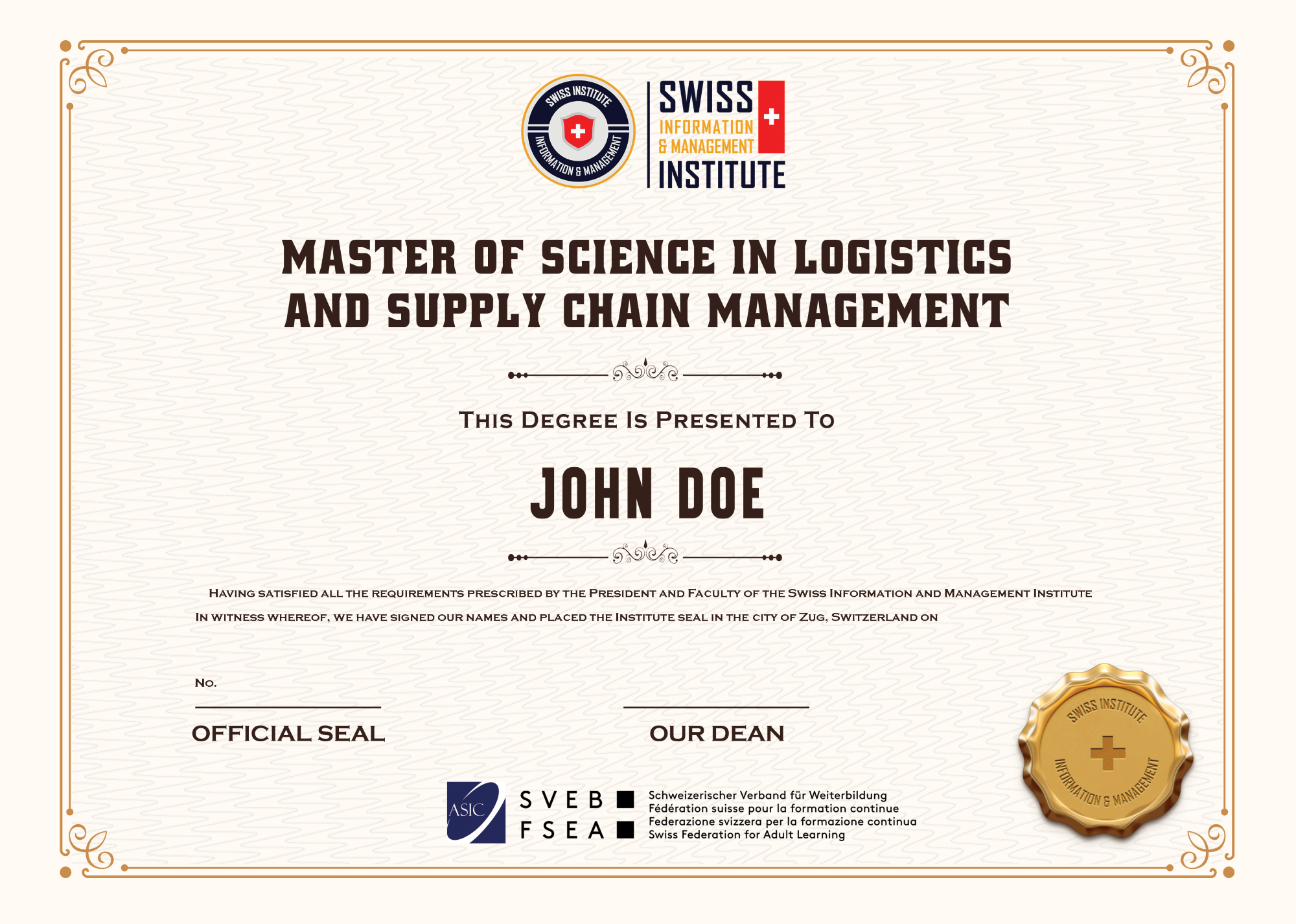
2. Refer to SIMI Swiss Program information in SVEB Switzerland
SVEB Switzerland (Schweizerischer Verband für Weiterbildung) is the Swiss Federation for Adult Learning and serves as the national umbrella organization for adult education in Switzerland. SVEB is recognized as the leading authority in Switzerland for promoting and supporting lifelong learning and professional development through a wide range of educational programs and certifications.
Benefits of the SIMI Swiss Programs Published in SVEB:
- Officially on the Swiss federal portal: Being published in SVEB gives the SIMI Swiss program official publication in Switzerland, validating its quality and adherence to Swiss educational standards.
- Increased Credibility: Membership and listing with SVEB enhance the credibility of the SIMI program, making it more attractive to prospective students and employers who value SVEB-approved programs.
- Professional Advancement: Programs listed with SVEB are often aligned with the needs of the Swiss job market, increasing graduates' employability and supporting their career progression within Switzerland.
- Access to a Wider Network: Association with SVEB connects the SIMI Swiss program to a broader network of educational institutions, professionals, and employers across Switzerland, offering opportunities for collaboration, networking, and knowledge exchange.
- Compliance with Swiss Standards: SVEB ensures that SIMI Swiss programs meet high educational standards, including up-to-date content, qualified instructors, and effective teaching methods, enhancing the overall learning experience for students.
- Support for Lifelong Learning: SVEB’s focus on adult education means the SIMI Swiss program aligns with lifelong learning principles, supporting students in their ongoing professional development.
Check the SIMI programs on SVEB HERE.
3. Notary Public and Apostille for SIMI Qualifications in Switzerland
Notary Public and Apostille for SIMI Qualifications in Switzerland
In Switzerland, a Notary Public can certify copies of academic degrees and diplomas by verifying their authenticity and confirming that they match the original document. This notarized certification is often required for legal, academic, or professional purposes, such as further studies, job applications, or immigration procedures.
For international use, a notarized degree may also require an Apostille from the relevant Swiss authority (usually the cantonal State Chancellery) to ensure its recognition in countries that are part of the Hague Apostille Convention.
Sample:
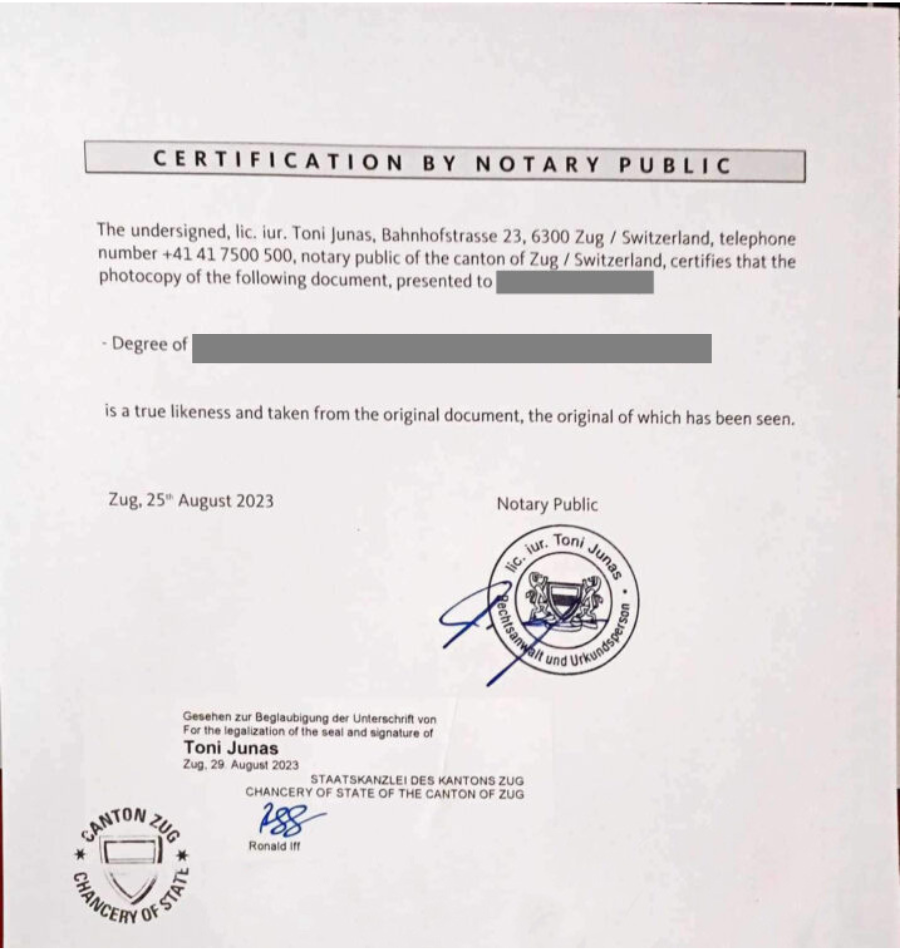
Note: The information provided above is accurate at the time of publication. However, the content is subject to change in accordance with adjustments to the laws of each country and may be updated without prior notice.
4. Accreditation & recognition of OTHM
About the Ofqual UK.Gov awarding body OTHM:
- Recognized as an organization by the educational authority of the United Kingdom, Ofqual (UK.Gov). Recognition Number: RN5284. Refer to the recognition information CLICK HERE
- OTHM Level 7 Diploma in Logistics and Supply Chain Management is accredited with the Ofqual UK.Gov code 603/5865/8. Refer to the accreditation information CLICK HERE
Reference:
- Guidelines of how to check the recognition of OTHM: CLICK HERE
- The meaning of Level System in the labor market in the context of global labor mobility: CLICK HERE
- The meaning of Level System in global diploma recognition: CLICK HERE
Sample Certificate of OTHM Level 7 Diploma in Logistics and Supply Chain Management:
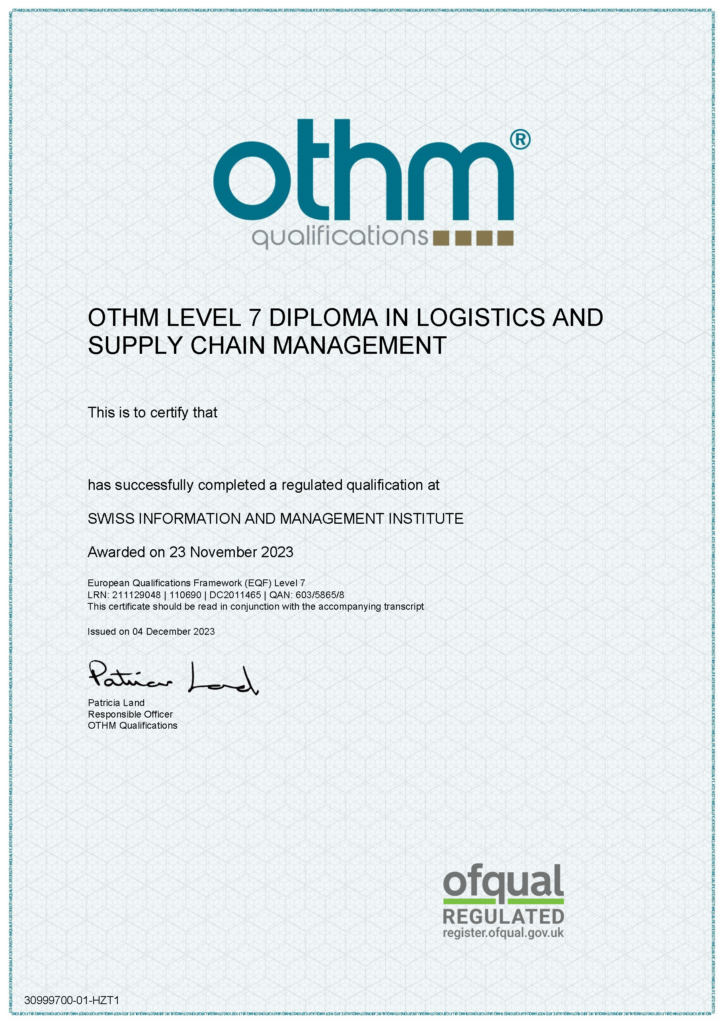
Sample Transcript of OTHM Level 7 Diploma in Logistics and Supply Chain Management:
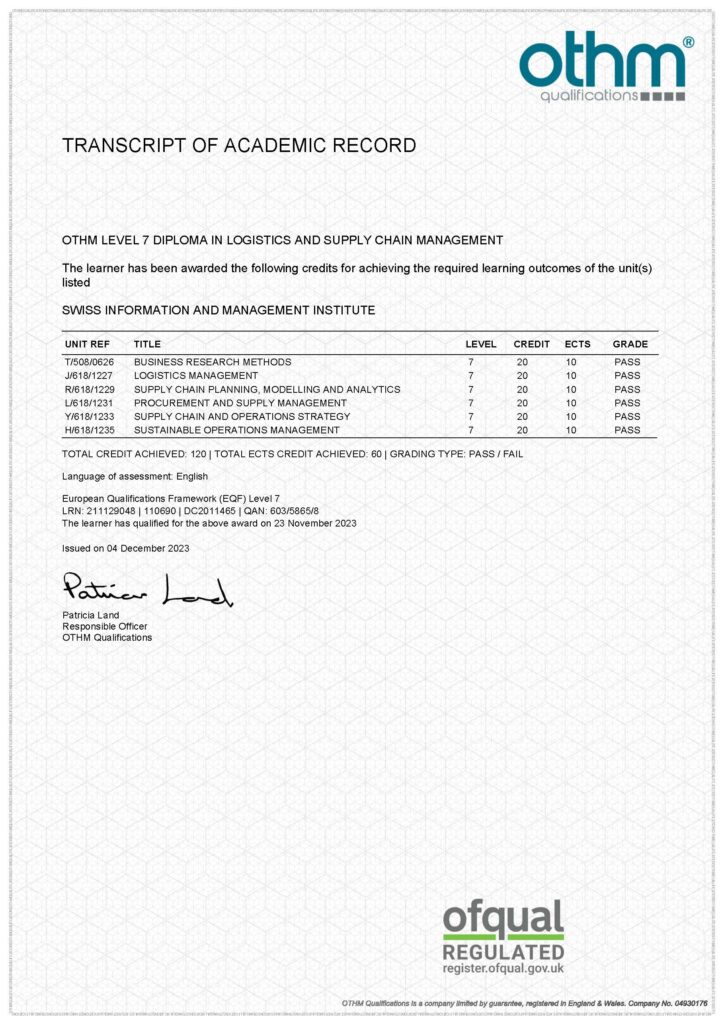
5. Program accredited by ISCEA Switzerland
The program is accredited by ISCEA (International Supply Chain Education Alliance) Switzerland (See more HERE) and graduates have enough knowledge to take the exam to receive the Certified Sustainable Supply Chain Professional (CSSCP) certificate from ISCEA (See more HERE)
About ISCEA Certified Sustainable Supply Chain Professional (CSSCP):
- The first and most advanced professional certification in supply chain management.
- ISCEA Certified Sustainable Supply Chain Professional (CSSCP) is implemented by many leading universities (See more about the ISCEA CSSCP program implemented by the University of Cambridge HERE)
- Refer to the tuition fee of the ISCEA CSSCP program HERE.
About ISCEA Switzerland:
- ISCEA Switzerland is owned by SIMI Swiss in cooperation with ISCEA USA.
You will get
Dual Master
CSSCP from ISCEA
30 Pro Recognized
Swiss Student Card
Academic Support
Update Trend
All Master' Programs
Fully Accredited
Multi Recognition
Master of Business Administration
Powered by BizSchool of Zug
Master of Arts in Project Management
Powered by BizSchool of Zug
Master of Arts in Education Management & Innovation Pedagogy
Powered by Swiss EduSchool
Master in TESOL
Powered by Swiss EduSchool
Master of Arts in Human Resource Management and Talent Development
Powered by BizSchool of Zug
Master of International Business Law
Powered by Law Institute of Switzerland
Master of Artificial Intelligence
Powered by IT Institute of Switzerland
Master of Psychology
Powered by Swiss PsySchool
Master of Science in Logistics and Supply Chain Management
Powered by LSCM of Switzerland
